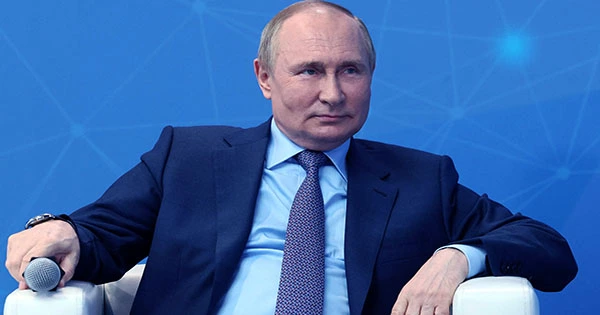After Russian media spread the false information that his nation was planning to permit NATO to deploy nuclear weapons on its soil in peacetime, Swedish Prime Minister Ulf Kristersson issued a warning to his countrymen on Wednesday (11 January) cautioning them against falling for Moscow’s propaganda.
In order to commemorate the beginning of Sweden’s six-month EU Council Presidency, Kristersson briefed a group of more than 60 Brussels-based journalists who traveled to Sweden on a press trip.
Kristersson, who assumed office in October of last year, is the leader of the European People’s Party-affiliated conservative Moderate Party. Although he is part of a challenging coalition that includes the populist, right-wing Sweden Democrats, he declared that he is working toward a pro-European agenda.
On Sunday, Kristersson stated at the Folk, a yearly national defense conference, that putting nuclear weapons on Swedish soil in a period of peace was not an option.
However, numerous Russian media outlets falsely claimed that he had indicated the contrary, i.e., that Stockholm would permit nuclear weapons in times of peace.
According to a high-level participant from Sweden who wished to remain anonymous and spoke to EURACTIV, “quite respectable citizens” had even used social media to spread the stories from Russian media.
Fellow Swedes should exercise extreme caution and refrain from disseminating false information on social media, according to Kristersson.
NATO membership has long been opposed by Sweden’s left. However, Sweden’s Social Democrats shifted course, upsetting many of their supporters and revealing profound fissures among the Left as the popularity of joining the alliance increased due to the conflict in Ukraine.
The high-level speaker indicated that Sweden’s shift in strategy would not have been possible without Finland’s neighbor making a harder effort to join NATO.
Therefore, it is likely that Russia wants to weaken support for the two Scandinavian nations joining NATO at a time when Turkey and Hungary are still delaying the confirmation of their membership applications.
When questioned about Turkey’s resistance, Kristersson refuted earlier claims that he had stated that Turkey was expecting “too much” in return for the ratification from Sweden.
Using the moniker Ankara is advocating for worldwide use, he claimed that communications with Türkiye were “extremely well” progressing.
He asserted, “We are demonstrating to Turkey that we are doing exactly what we said we would do,” while acknowledging that Ankara “occasionally identifies people” they wish to have extradited.
The prime minister declared, “Swedish law is extremely clear — only courts can decide.
When questioned about the conflict in Ukraine and Sweden’s support, Kristerssonr responded that he had met with Ukraine’s President Volodymyr Zelenskyy two days prior and had received confirmation that “we want to do more.”
When specifically questioned about the kind of military hardware that will be provided, he declined to provide such information but said that the deliveries were “organized with partners”.
Jessika Roswall, Sweden’s minister for European affairs, responded to inquiries from the media. When questioned about whether Sweden’s delayed approval of its NATO application amounted to blackmail given that Hungary is through an Article 7 procedure and could lose significant EU funding, she vehemently maintained that the two processes took place “in parallel.”
She stated that contact with Budapest is developing and the Swedish Presidency intends to observe “the effect” of this development.
She said that up until now, decisions about the EU agenda were made in the EU affairs committee of the Swedish parliament when asked how the Swedish presidency was going to cope with its uneasy governing partner, the Sweden Democrats.
According to a Swedish source, the Sweden Democrats’ only option up to this point was to accept their defeat in the legislature.
The source cited as an illustration the Swedish parliament’s vote on the Schengen expansion, which the far-right party vehemently opposed. Despite the Sweden Democrats’ resistance, the vote was successful in the parliamentary committee, and Sweden ultimately voted in favor at the EU level without upending the ruling coalition.
The high-level interlocutor described the new Swedish cabinet’s job as “learning by doing.”
















